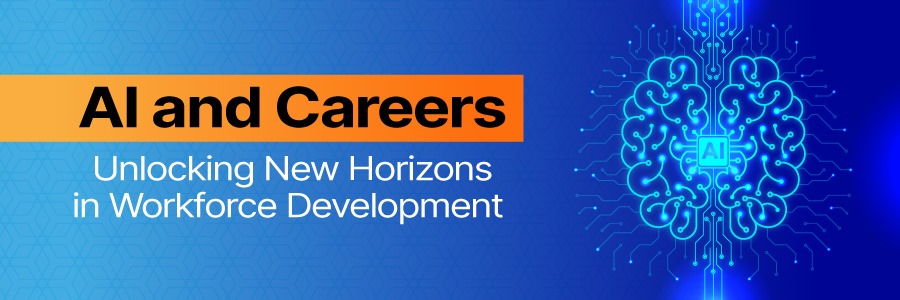
By: Creonow
The rise of artificial intelligence (AI) is nothing short of remarkable. It is transforming industries, reshaping traditional job roles, and carving out the future of work. As AI becomes more integrated into business operations, the workforce must adapt in tandem.
A report from the World Economic Forum suggests that AI will create 97 million new jobs by 2025, even as it automates certain tasks. This dual effect makes AI a challenge and an opportunity for workforce development.
AI is unlocking possibilities that were unimaginable just a decade ago. Let us explore how AI is transforming careers and redefining the workplace of tomorrow.
The Impact of AI on Careers
Creating New Job Opportunities
AI isn’t just taking over repetitive tasks. It is generating entirely new career paths. Roles like AI ethicist, machine learning engineer, and data annotator didn’t exist a decade ago but are now in high demand.
Industries such as healthcare, finance, and manufacturing utilize AI to develop specialized roles focused on implementing and managing intelligent systems.
For instance, in healthcare, AI drives innovation in diagnostic tools, leading to roles in AI-based medical technology. Similarly, the finance industry recruits AI specialists to develop fraud detection systems and predictive analytics.
Transforming Existing Roles
AI is transforming traditional job functions by automating mundane tasks, allowing employees to focus on more strategic, high-level work. In marketing, AI-powered tools handle data analysis, enabling marketers to spend more time on creative strategies.
Customer service roles evolve as AI chatbots handle routine queries, allowing representatives to tackle more complex and human-centric issues. This transformation is enhancing job satisfaction and productivity across industries.
Reskilling and Upskilling: Preparing for AI-Driven Careers
The Need for Lifelong Learning
As AI continues to disrupt job markets, the importance of reskilling and upskilling cannot be overstated. Nearly 375 million workers globally may need to learn new skills by 2030 due to automation. Governments, organizations, and educational institutions are recognizing this need and offering programs tailored to AI-driven workforce demands.
Skills in Demand
AI-driven careers require a blend of technical and soft skills. Some key competencies include:
Technical Skills:
Soft Skills:
Corporate Reskilling Programs
Organizations are investing in upskilling programs to prepare their employees for the future For instance, Amazon pledged $700 million to upskill 100,000 employees in areas like machine learning and data science by 2025.
Challenges in Workforce Development
Bridging the Skills Gap:
Besides the availability of reskilling programs, a significant skills gap persists. Many workers lack access to affordable and effective training, leaving them unprepared for AI-driven roles. Governments and organizations must collaborate to create inclusive programs that bridge this gap.
Resistance to Change:
Employees may resist adopting AI-driven workflows due to fear of job loss or unfamiliarity with technology. Clear communication, training, and showcasing the benefits of AI can help mitigate this resistance.
Ethical Concerns:
The integration of AI raises ethical questions like data privacy and algorithmic bias. Workforce development must include training on AI ethics to ensure responsible technology usage.
Industries Leading the AI Revolution
Healthcare:
AI revolutionizes healthcare through predictive analytics, robotic surgeries, and personalized medicine. Careers in AI-powered diagnostics and telehealth solutions are growing rapidly.
Manufacturing
In manufacturing, AI-powered automation optimizes supply chains and enhances productivity. This shift creates demand for robotics engineers and data analysts who can manage intelligent production systems.
Education
AI is transforming education through adaptive learning platforms that customize lessons for individual students. Educators use AI to enhance student outcomes, creating opportunities for specialists in AI-enabled learning systems.
Retail and E-Commerce
AI is reshaping customer experiences through recommendation engines, inventory management, and chatbots. This has led to roles in AI-based customer insights and predictive sales analytics.
The Role of AI in Diversity and Inclusion
AI has the potential to promote diversity and inclusion in workforce development by minimizing unconscious bias during recruitment. AI-driven tools can assess candidate profiles objectively, focusing on skills and qualifications rather than demographic factors like gender and ethnicity.
Still, organizations must ensure their AI systems are free from biases embedded in training data. By promoting diverse and inclusive hiring practices, AI can help organizations build teams that are not only innovative but also reflective of a global workforce.
The Future of Work in an AI-Driven World
Hybrid Work Models:
AI enables hybrid work models by facilitating remote collaboration, automating administrative tasks, and optimizing workflows. This shift allows employees to achieve a better work-life balance while maintaining productivity.
The Gig Economy:
AI is driving the gig economy by connecting freelancers with opportunities that match their skills through AI-powered platforms. This trend is giving rise to flexible, project-based careers.
Human-AI Collaboration:
The future of work lies in collaboration between humans and AI. While AI handles repetitive tasks, human workers will focus on creativity, problem-solving, and strategic thinking. Organizations that successfully blend human and AI capabilities will have a competitive edge.
Summing up
While automation may pose challenges, it also opens doors to many opportunities for workforce development. The key to thriving in an AI-driven world lies in adaptability and lifelong learning.
Organizations, educators, and employees must work together to ensure this transformation benefits everyone, paving the way for a future where humans and AI co-create success.